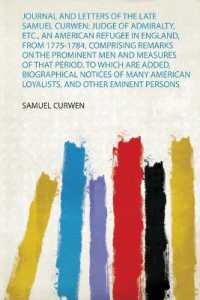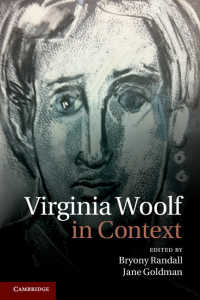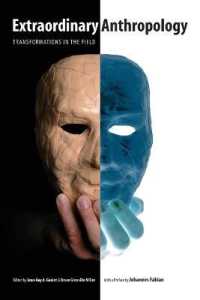- ホーム
- > 洋書
- > 英文書
- > Philosophy
Full Description
Now in paperback, Sandra Laugier's reconsideration of analytic philosophy and ordinary language.
Sandra Laugier has long been a key liaison between American and European philosophical thought, responsible for bringing American philosophers such as Ralph Waldo Emerson, Henry David Thoreau, and Stanley Cavell to French readers—but until now her books have never been published in English. Why We Need Ordinary Language Philosophy rights that wrong with a topic perfect for English-language readers: the idea of analytic philosophy. Focused on clarity and logical argument, analytic philosophy has dominated the discipline in the United States, Australia, and Britain over the past one hundred years, and it is often seen as a unified, coherent, and inevitable advancement. Laugier questions this assumption, rethinking the very grounds that drove analytic philosophy to develop and uncovering its inherent tensions and confusions. Drawing on J. L. Austin and the later works of Ludwig Wittgenstein, she argues for the solution provided by ordinary language philosophy—a philosophy that trusts and utilizes the everyday use of language and the clarity of meaning it provides—and in doing so offers a major contribution to the philosophy of language and twentieth- and twenty-first-century philosophy as a whole.
Contents
Preface
Introduction
CHAPTER 1. From Empiricism to Realism
CHAPTER 2. Relativity, Conceptual Schemes, and Theories
CHAPTER 3. Truth, Language, and Immanence
CHAPTER 4. Language, Facts, and Experience
CHAPTER 5. Empiricism Again
CHAPTER 6. Language as Given: Words, Differences, Agreements
CHAPTER 7. The Ordinary as Heritage: Natural and Conventional
CHAPTER 8. The Myth of Inexpressiveness
CHAPTER 9. To Speak, To Say Nothing, To Mean to Say
Conclusion
Notes
Bibliography
Index








